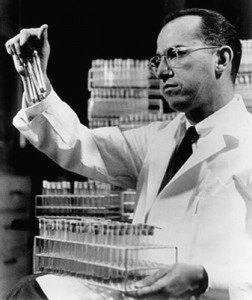Jonas Edward Salk (1914-1995) was born in New York to poor Russian-Jewish immigrants. His own dream was to be a lawyer, but his mother pushed him to enter the field of medicine. Salk decided to do research instead of becoming a physician, driven by a vision to help all of mankind rather than just a few patients. However, because he was a Jew, Salk was barred from working at many institutions. Nonetheless, during this time he developed an influenza vaccine that was widely used by the US army. Eventually he found his way to work in cramped quarters in the basement of Pittsburgh’s Municipal Hospital. A grant from the Mellon family allowed him to build a proper virology lab. It was there that Salk developed the polio vaccine in the post-war epidemic that plagued the world. Before the vaccine was introduced in 1955, polio killed over 3,000 people and left over 20,000 paralyzed every year in the US alone! One of the most famous victims was President Roosevelt, confined to a wheelchair for much of his term in office. It was said that “Apart from the atomic bomb, America’s greatest fear was polio.” Salk worked tirelessly to create the polio vaccine, labouring sixteen hours a day, 7 days a week. When asked who owned the patent he replied “There is no patent. Could you patent the sun?” Salk received the first-ever Congressional Medal for Distinguished Civilian Service, as well as the Presidential Medal of Freedom. More significantly, his achievement inspired a dramatic increase in government funding of medical research. In 1960 he founded the Salk Institute, a world-reknowned centre of medical research. Salk also published several books, and is considered the father of the field of “biophilosophy”. He spent the last years of his life trying to find a cure for HIV/AIDS.
Words of the Week
A denigrating attitude toward others while inflating one’s own importance makes one lose all his spiritual gains, God forbid.
– Rabbi Menachem Mendel Schneerson, The Lubavitcher Rebbe (Hayom Yom, Iyar 20)

